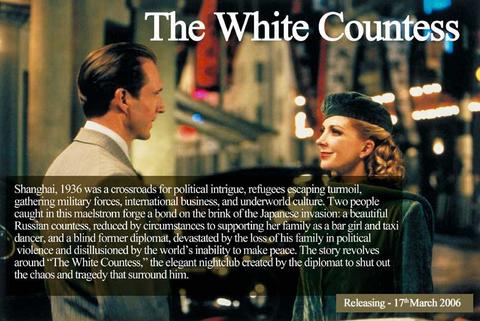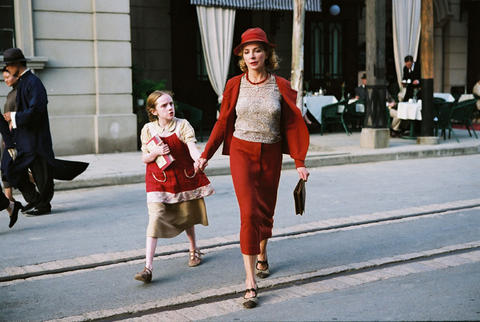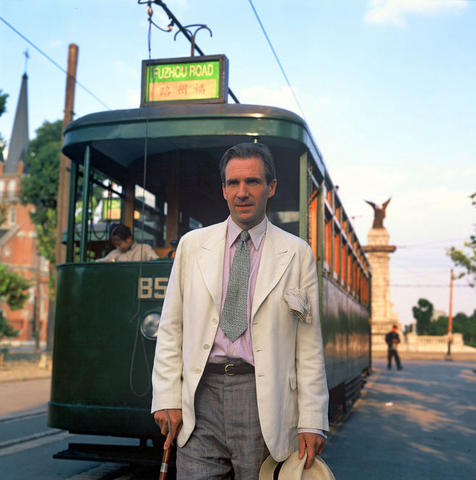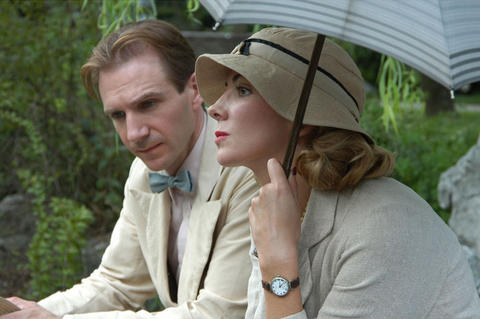Ellen and Jim Have a Blog, Too
We are two part-time academics. Ellen teaches in the English department and Jim in the IT program at George Mason University.


It's the pictures: An Inconvenient Truth and The White Countess · 12 June 06
Dear Anne,
This weekend Jim, Yvette and I went to see An Inconvenient Truth and on Saturday I watched The White Countess on a DVD on my small TV at home. I recommend both.
Jim thought Gore’s film is best when it’s a lecture. And there are quite a number of moments like this one:

Gore delivers a concise persuasive argument that 1) global warming is happening (which includes a definition of what it is and its cause, the increase of carbon dioxide in our atmosphere; 2) its effects put our present locations, cities, and countrysides, and way of life at grave risk; 3) among the latter (risks), heating up the atmosphere creates many more and high intensity storms which kill people and destroy places; and 4) most important, we can do something about it, mostly gradually, but we can.
It could also serve as a campaign film. Interspersed with the line of argument, he told the story of his life,: his background as the son of a wealthy farmer and senator; his love of the land; how when in college he came to know and to care so passionately about this issue. Why as the son of a man who farmed tobacco he understands the difficulties of doing something. Very moving was his inclusion of how hard a blow it was to him when by the rules of the game he lost the presidency. He got in some good jokes, such as the still he found among the Republican propaganda which showed gold bars on the one side and the earth on the other. He said we didn’t have to choose between, but he also made fun of the appeal of the bars, and grimaced at the thought that we were to give up the whole earth for a few gold bars (for the few).
Those who say that attack ads are what work against opponents might say this film is weak as a campaign film, for Gore is careful not to trash Bush fils at any point. To me that made him seem all the nobler—as Bush is the worst president we’ve had in this century. He’s not simply undermining the constitution, but has set in place public torture and made the lives of countless people worse or over. I should say I voted for Gore and I’ve since come to think that his not getting the presidency (it’s having been stolen from him through falses highjinks, Nazi bullying methods, and the supreme court’s elitist tyranny) has been one of the first tragedies of the 20th century. Were he to run, I vote with intense enthusiasm for him. I didn’t need this film to feel that.
Actually I’m not sure Jim is right, for although a couple of the joking cartoons seemed silly and incomprehensible (I didn’t get what that Simpson little girl eating ice cream was supposed to convey), and some were urban legends (when the lukewarm water a frog is put into is heated up, the frog does jump out), essential to the film’s impact were the visuals: pictures of the earth, pictures of places which once were covered with snow and ice and now are plains, pictures of Katrina, pictures of Gore and the places he grew up. And very like many documentaries, we follow him as he walks here and there, talks to people, taps on his laptop, simply looks out at the worlds pictured and dreams.
Duarte Design did the pictures. This is a firm of designers known for the stunning effectiveness of their work.
In a film it’s the pictures that matter. The movies. Moving pictures. I copy and paste below a review of The White Countess, another and the last Ivory-Merchant type product, which review I found on Internet Movie Database which fills you in on the story line and background of Japanese invading Shanghai. If you want a shorter one, here’s the promotional still:

Jim did mock the film at first by suggesting it’s ultimately falsifying nostalgia about the British empire, presenting the honorable Top White Female and Male as ever so precious people with their good taste and morals. This is common in Booker Prize books where an idealized vision of English life, landscape and history is often presented as part of the post-colonial subtexts of the stories. The author of the screenplay for The White Countess is Kazuo Ishiguro who has won and been short-listed for the the Booker more than once (e.g., The Remains of the Day, adapted into a film with Anthony Hopkins and Emma Thompson).
He agreed, though, that the film was profoundly pessimistic too and had a statement to make about the politics and violence of all countries, the human animal, and its perspective could be justified if only some more of the bad guys had been European and some more of the good people non-European. There was certainly no sentimental condescension and idealizing of the Asian characters. In fact only three characters and one child are actively good people.
The Casablanca element or phase or part of the story (referred to above in the synopsis in the bit about the nightclub) is embedded in a larger story of an exiled Chekovian Countess Sofia Belinska (Natasha Richardson, our heroine, the vulnerable type we find at the core of many l’ecriture-femme stories) who is treated like shit (that’s the word) by her family, as a polluted being, because the way she makes money is to sell her body for sex at nightclubs. All the while they live off this money. None of them work. Vanessa and Lynne Redgrave act two of the women. (real life biological mother and aunt to Richardson). There is an attempt to alienate her daughter, Katya (played by Madeleine Daly), from her, and we are made to feel angry/alienated ourselves by the woman who is a cousin and attempts to keep the child away from her mother and fill the Countess with shame.

At the last minute of the film though we are led to sorrow for this woman too.
The magnificent performance is again Fiennes (our hero, Mr Jackson, whose first name we never learn), very much the type he plays in Faith Healer, Constant Gardener and other films recently). He seems to have the right sychological baggage from film to film for this year. You could almost take a haunting still from Constant Gardener and slip it into The White Countess and it would belong.
In The White Countess, we are led to glimpse Mr Jackson’s very honorable career as a civil servant trying to set up the League of Nations. Mr Jackson was a man of real integrity. Then he was involved in a terrible fire bombing; in attempting to save a daughter (when he knew he couldn’t), he is blinded. People can behave like this: I’m told I had a cousin who was gassed to death in an extermination camp. She was taken with six children (all small, hers) and told she could survive but they would have to go. She refused. She went to her death with them. His wife dies too—we are not told how. A lot is evaded.
I said you could almost slip in the still from The Constant Gardener (or one from The Faith Healer for that matter). First Mr Jackson is ever impeccably dressed despite a frequently drunken state. He is also blind. I read somewhere Fiennes studied the external behavior of blind people by watching a blind person go through life over the course of a log day, and, Anne, it’s his stunning overt repetition of their behavior outwardly that makes the film continually so poignant. Here is one such moment:

The look on Fiennes’ face (one we see in Constant Gardener and Faith Healer too) of haunted but gentle bitterness and irony as he slowly turns himself into a Rick as all he can bear to do and can do—is thus emphasized intensely. He is groping and helpless, but carries on with a steeled inner dignity. We are not told how he manages to set up a club and make it work: what contacts, money &c&c., where he gets the performers (whose music is touching as well as modern, tasteful), the right lights, glitter. Why is it that everyone we see treats him with exquisite courtesy?
These evasions in the film permit the romancing idealizations. They also imitated how our world works today too: much put into the media is lies, to the point that (as Azar Nafisi says in her Reading Lolita in Teheran), sometimes when you are shown something in a picture in a newspaper or TV you can assume the opposite has occurred. The authorities in Constant Gardener put it about that Arnold Bluhm, the black doctor who accompanies the heroine, has himself raped and murdered her, and cannot be found; in fact he was brutally tortured for days, horrifically murdered and then not left to rot lest his body be found.
There is a Japanese man, Mr Matsuda (Hiroyuki Sanada) who is a politician who is presented as regretting having to poison the
worlds he lives in, a powerbroker; Mr Matsuda swims with the tide and comes out on top, ahead of it. We see him standing on a balcony, looking down at a huge crowd of people. They don’t see him, but his actions influence their fate. There he is, the man who just does the things the ruthless and amoral want and rises to the top. It’s hinted Mr Matsuda is responsible for the club getting off the ground and keeping going.
The film is at moments tongue-in-cheek or overly deliberately self-conscious. James Ivory is making fun of the genre elements and melancholy over-the-top masterpieces he’s exploiting. Take this overtly Chekhovian still:

The tongue-in-cheek stance is seen in the presentation of the analogies to Casablanca: at one point Mr Jackson tells Mr Masuda says they have it all down pat ("perfect"), except they lack the necessay "political tension." Like a recipe. Could Mr Matsuda provide political tension? Soon the different factions in Shanghai are there too. This sequence reminded me of how a couple of politicians were presented in the recent film adaptation of Graham Greene’s A Quiet American (films imitate films).
The third good character is in the film is a Jewish man, Mr Feinstein (Alan Corduner) who has fled the viciousness of Europe; he is linchpin providing the qualified happy ending (an escape) at the close of the film. What is it? Mr Jackson, the Countess, and Katya manage, just, to stay together, and to esape. "Our natural business lies in escaping," says Robert Bolt’s Sir Thomas More in the very great A Man for All Seasons.
The second or inclusive element that "makes" the film great and the performances effective are of course the pictures, here vast ironic pictures of desperation, anonymity, glamor, landscapes of all kinds which resonate with what we see on TV, the horrors of our age. They are done quietly and often ironically: at one point Fiennes is facing a firing squad and we think they will kill him. He says something like I’m just walking through "gentleman" and a shout is heard and they put their guns up. It’s the ironic gentle addressing of these thugs as "gentlemen" that makes the scene powerful too. So I don’t discount the captions.
Still after still is a haunted replication or variation on some violation of human beings, some ironic point about how people relate, and in the scenes we have a very few people who are decent and suddenly say something resonant. I’ve been rereading LeCarre’s Constant Gardener, the screenplay, and also Paul Scott’s Staying On. The intellectual content of these is occasionally epitomised in this or that fleeting epitomizing dialogue.
An Inconvenient Truth is effective and The White Countess very great movie making you see. A movie is a series of moving pictures, the music behind is of enormous importance (like an opera) in influencing the viewer’s feelings (and the music is continually right), with masque like archetypes and captions of statements. It’s in the juxtapositions of pictures that the design works. And here too juxtaposed scenes were done right.
A new problem with modern films—once you’ve gotten used to the way the computer is now central (for shots and for keeping the actors embedded in scenes)—is how brief are the shots or stills. I’ve read on average shots or scenes/stills took a couple of minutes (with the occasional high scene going yet more), & many 11 seconds; now the many are 8 seconds and the high point is never more than say 5 to 6. The White Countess works this way, and the scenes move too fleetingly. It goes too fast. Of course much more content is therefore included.
To me it’s a sign of why so many movies are so poor that in the US this film where I live barely stayed in the theatres one weekend. It’s out on DVD and I took the last of 3 copies in the video store. The reviewer I include on IMDB who praised the movie highly worried the film might flop because of its evasions. I think it works on a too intelligent level with its themes dominating, allusively, and you don’t get open sex or violence that you are invited to be gratified or stupidly in the words, and there’s no overpointed plot. It has what makes films great, that’s all.
Sophie
**********
Author:
from Scotland, United Kingdom:
"The dreams of two unlikely strangers form the basis for this sophisticated drama one of a world that has been lost and the other of a world that has yet to be found.
Snowflakes fall mysteriously in a grand ballroom somewhere in Russia, echoed in the mind of a beautiful girl in a slum district of Shanghai 1936. Natasha Richardson is a countess, fleeing the Bolshevik revolution, making a living any way she can to support her family. This means working in shady dance halls as a taxi-dancer (and presumably, occasionally, as a prostitute). Her five family members (all older except for a young daughter) loathe the shame she brings on them but have no other means of support.
Ralph Fiennes is a disillusioned US diplomat. He has helped the formation of the League of Nations, is a successful business man, and a hero Chinese nationalists, but has seen all the best efforts to have people live in peace come to nought. Shanghai is full of political tensions just before the Sino-Japanese war. Fiennes finds solace drinking in lowlife bars and avoiding what he sees as the hypocrisy of those that hold him in such high regard.
A vast amount of talent has been poured into this film: it is the final collaboration of Merchant and Ivory (Ismael Merchant died shortly before final production), the screenplay is by the award winning novelist Kazuo Ishiguro (who worked with them on Remains of the Day), the other crew are top notch, and the cast also includes both Lynn and Vanessa Redgrave. Yet there is no easy conclusion when asking if it is a major triumph.
The film has a pervading sense of the unexplained, which continues for its whole length (over two hours), so piecing it together is not easy. The politics of the time and place are probably not familiar to most audiences, and the bewildering array of nationalities does not help. Ishiguru’s talent is for transcending the material content and taking us into the world of ideas, but it needs most of our concentration to accept the material idea of Shanghai 1936 (which, although painstakingly recreated, often feels like a film set inhabited by a well-known English cast). Not surprisingly, there may be little energy left over for more cerebral imaginings. Fiennes is an American, Richardson and the Redgraves are Russian even before we meet the Jewish neighbour, the French Consul, a Japanese nightlife connoisseur—and none of the main characters (or actors) are Chinese. But then the ideas are not particularly Chinese either: Shanghai is nothing more than Ishiguro’s canvas.
Prising out the dreams gives us some clues. Richardson (Sofia) is no tart-with-a-heart. Their Jewish neighbour, also a refugee, has fled such horrors that mere verbal insults (the worst he has to suffer in Shanghai) fall off him like a deaf man. But Sofia’s family are less self-assured. They dream of a decent existence, but Sofia has the greatest moral fibre, in spite of her job. She receives the respects of a Russian Prince now working as a porter. She warns Fiennes (Jackson) who is also blind of a hidden danger and gains his lasting respect.
Jackson has noticed that in the dance halls there are no politics. He longs for a nightclub where people of any political persuasion can relax and mingle freely. Like Sofia, he is tarnished by all the rules of the real world, but his aspirations are higher than his outward lifestyle and the ‘bigger picture’ of those that would judge him.
Early in the film, Sofia says to a co-worker, "All of us here have to fall in love from time to time to feed our children," yet the film turns many ideas of ‘love’ on their head before it reaches its (thankfully) emotionally resounding climax. Equally ironically, Jackson speaks of the "vague promise of an intimate encounter" (in an ideal nightclub) when the reality is that merely the vague dream of any intimacy of feeling is the most either he or Sofia feel they could even hope for.
As a meditation on the commonality of death and sex, of the impotent struggle of goodness and taste against the wars that mankind seems addicted to, The White Countess has much to offer. The image of Fiennes in overcoat andbow-tie, calmly pouring brandy as the bombs fall around him, sticks in the mind like the scream of a child. Director James Ivory could have underscored such moments to much greater effect than allowing them to be swallowed in a complex story and an unfamiliar period of history. Fiennes’ character seeks some political tension that stops short of violence, but his character and the film often lack that very quality.
What seems at first like instant noodles, badly re-heated, holds more sustenance than most will sadly give this film credit for; and if it is a triumph for the Merchant Ivory / Isuguro team, it is one, like its characters and their dreams, so heavily flawed that the aficionados who draw anything from it may well be accused of an over-active imagination."
**************
Well I don’t agree it’s heavily flawed. Rather it demands more concentration and imaginative work on the part of viewers than most are willing to give. It is the movie equivalent insofar as the commercial and commodity aspect of movie-making allows of a great work of literature.
I hope to buy Isiguru’s original screenplay, Anne. I’ll have to seek a bargain. At least there is one in print. Someone recognized the text and pictures should not be lost.
It’s pouring here today, Anne. But then it’s not hot. I hear the rain hitting on my roof and the awning. More about our summer doings soon,
Sophie
--
Posted by: Ellen
* * *
Comment
commenting closed for this article
